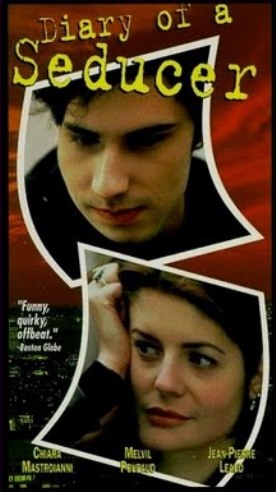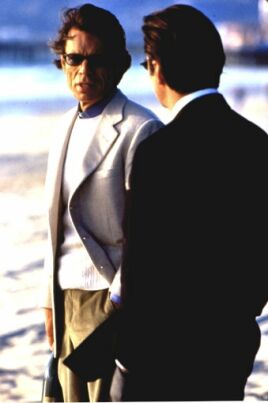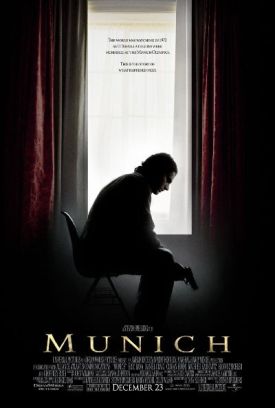Behind the Sun (Abril Despedaçado)
Walter Salles, whose Central Station was such a delight, has now produced another accomplished film which uses a child- narrator’s experience to contrast Brazil’s paradisal coast with its forbidding interior. But the new film, Behind the Sun, has a more didactic purpose and, although there are many strikingly good things in it, the cuteness and warm- heartedness so much in evidence in both films degenerates by the end of this one into mere fantasy. Having presented us with a fairy-tale-like but nevertheless remarkably accurate account of the rituals of blood-feud among the sugar plantations of up-country Brazil in 1910, he simply drops the whole subject by offering as a solution to the seemingly intractable problems confronting the Brazilians of the period the solution of their grandchildren and great-grandchildren: Just go to the beach!
The story is based on a novel, Broken April, by Ismail Kadaré, about family feuds in Albania. Now if you are interested in family feuds, Albania is the place you want to go. Albanian feuds are even more lasting and inexorable than Sicilian ones. There is a whole book of rules, called the Kanun by Lekë Dukagjini, which explains to all interested Albanians — and all Albanians are interested — how you carry on your feud: whom you can and can’t kill and when and where and how. There is nothing comparable in Brazil, but the demands of honor, up until about a hundred years ago, when this film is set, were pretty similar all over the world. If one of theirs kills one of yours, you have to kill him or your whole family is dishonored. It seems crazy, I know, but for whatever reason human kind in almost every culture known to us for thousands of years lived by such rules.
To explain them to us, Salles introduces us from the start to his voiceover narrator, a young boy called Pacu (Ravi Ramos Lacerda) whose youthfulness makes the whole honor system seem almost as strange to him as it does to us. It is a story, this boy-narrator tells us, “about me, my brother, and a shirt in the wind,” and we see the shirt on the clothesline with a large stain on it. It is a blood stain, but the red is turning to yellow. His family, the Breves, were once powerful landowners but are now living in grinding poverty. Literally grinding, since the whole family must pitch in to grind up sugar cane in an ox-driven mill and sell it for ever less money at the local village. “In grandpa’s time, the slaves did all the work,” says Pacu. “Now we do it.” And we see his father (José Dumont) driving the oxen around the mill while his older brother, Tonio (Rodrigo Santoro), feeds the cane stalks into it.
The grim and laborious turning of the mill symbolizes not only the dreary round of the subsistence life they live on the plantation but also the endless “cycle of violence” that is the film’s real subject. “We’re like the oxen here. We go round and round and never go anywhere,” says Pacu. Even at this early stage, he is dreaming of somewhere else, a place of escape perhaps “behind the sun,” — the sun which here is so hot that “your head boils like a pot of molasses” — from this awful life of nothing but work and honor. For that was the point of the bloody shirt. In flashback we see Pacu’s other older brother, Inácio (Caio Junqueira) carrying him across an open field on his shoulders when, from somewhere out of sight, he is shot and killed. His murderer appears to make sure he is dead and then leaves without harming Pacu. Now that the red stain is turning to yellow, father turns to the older of his remaining two sons and says: “Tonio, you know what you have to do.”
What he has to do is avenge his brother’s murder on the more powerful (and, ominously, more numerous) Ferreiras, with whom Father Breves has been in dispute over some land for a very long time. “Only kill your brother’s murderer, man to man, face to face,” says Pop, introducing us to the local code of honor. And he proceeds to do this, more or less. Then he comes to the dead man’s wake and funeral — this, too, seems to be in keeping with the local honor code — and asks the Ferreira patriarch for a truce. The old man says that he will give him just as much of a truce as he gave his grandson: that is, until the next full moon, or when the stain on the murdered man’s shirt has turned to yellow. Then he ties a black armband on his arm to mark him as doomed.
Everyone seems to accept this, and when a pretty young circus performer called Clara (Flavia Marco Antonio) comes to town, her step-father (Luiz Carlos Vasconcelos) casually informs her that Tonio, to whom she is obviously attracted, is a walking dead man. But when Tonio, who has never been anywhere, asks to come with this couple to the next town, he gets a taste not only of the wide world beyond the close confines of the plantation and the demands of honor which nail him to it but also of love. Pacu too is infatuated with Clara, who has given him a picture book. He can’t read, but he can read pictures, he tells her. And seeing a picture of a mermaid he happily announces that it is Clara herself. He thinks her a mermaid who lives in the sea, where he will go one day to live with her a life of freedom from work — and honor, and family.
There is some suspense built up around the approach of the full moon and the yellowing of the blood-stained shirt, but it will not be hard for most viewers to figure out what is going to happen. The feud which everyone tells us is utterly unrelenting and unforgiving turns out to be, after all, something that one party to it, at least (guess which?), can just drop and head for that watery kingdom where Pacu imagines he will be turned into the fish after which he has been named. There, as he tells the story based on the picture in his book, he and the mermaid will live together in the sea where everyone doesn’t die. “There was a lot of room for everyone. They were so happy. Laughing all the time. In the sea they were so happy together. They couldn’t stop laughing.”
I wonder if Salles reflected much on the fact that laughing in the sea seems to have become the contemporary Brazilian’s ideal in place of honor. But if honor is just to be forgotten about, if it was all so easy, why did the thing exist in the first place? Like Pacu’s fantasy, in other words, the movie takes up one of the hard problems of human existence and just wishes it away. A pity, considering how many things it does right.
Discover more from James Bowman
Subscribe to get the latest posts to your email.








